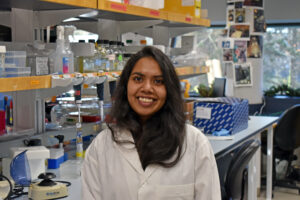Congratulations to Amrita Verma, a PhD student in Dr. Neil Cashman’s lab, who is one of the recipients of the 2023 ALS Canada-Brain Canada Trainee Awards.
“Investing in the future of ALS research means investing in the brilliant young minds who possess the insights needed to unravel the complexities of the disease,” says Dr. Viviane Poupon, President and CEO of Brain Canada. “Through the Clinical Fellowship Award and the Trainee Award program, Brain Canada proudly supports these up-and-coming scientists, as they are shaping a more hopeful future for those battling ALS.”
Recipients of the doctoral trainee awards will receive financial support over three years, providing Canadian labs with the necessary funds to have top researchers working on the best projects to better understand the disease and drive toward new treatments for individuals living with ALS.
We chatted with Amrita to learn more about her research and career goals.
What is your educational background and why did you decide to pursue a PhD in Neuroscience?

I have a Bachelor’s in Biotechnology from VIT University in India and a Master of Research in Brain Sciences from University College London in the United Kingdom. While completing my undergraduate and master’s thesis on neurodegeneration disease (ND), I was able to interact with individuals suffering from ND. Hearing insights from ND patients offered me a unique perspective that shaped the direction of my research and amplified my passion for studying neurodegenerative diseases. As a result, I decided to pursue a PhD in neuroscience.
What are your research interests?
With the global population aging and neurodegenerative diseases becoming increasingly common, I recognize that much more needs to be done to understand and combat these currently incurable diseases. My main research interest is to understand the pathophysiological mechanism behind these diseases, in particular ALS, and find a therapeutic target for them.
Tell us about your current research project.
In most ALS patients’ motor neurons, there are clumps of a protein called TDP-43. This interferes with the way cells work, causing a decrease in protein translation (the process by which protein is produced in the body). Recently, Dr. Cashman’s laboratory has found in the ALS cellular model that TDP-43 reduces the global protein translation. Our lab hypothesizes that restoring translation in sick neurons containing TDP-43 clumps could restore the health and function of the neurons, and thus be a helpful treatment for ALS.
I am working on finding the mechanisms behind global protein translation repression by TDP-43 by using transgenic fruit flies as a model, since they are living organisms and thus recapitulate the disease environment better than the cell model. Currently, I am conducting biochemistry and genetics experiments to understand what aspect of the translation pathway is affected by TDP-43 in hopes of finding a therapeutic target to elevate this repressed translation.
What are your future career goals?
In the future, I want to become a professor and set up my own lab where I can conduct independent research to screen, understand, and treat neurodegenerative diseases.
What advice do you have for students interested in graduate school?
My advice would be that it is okay to take it slow in the first year and try to understand the field you are working on during this time. It is okay to ask for help, whether it’s your experiment not working, trouble with the experiment design or general graduate school problems such as searching for a supervisor or losing interest in your research project. There are people with experience around you who are more than willing to help.


